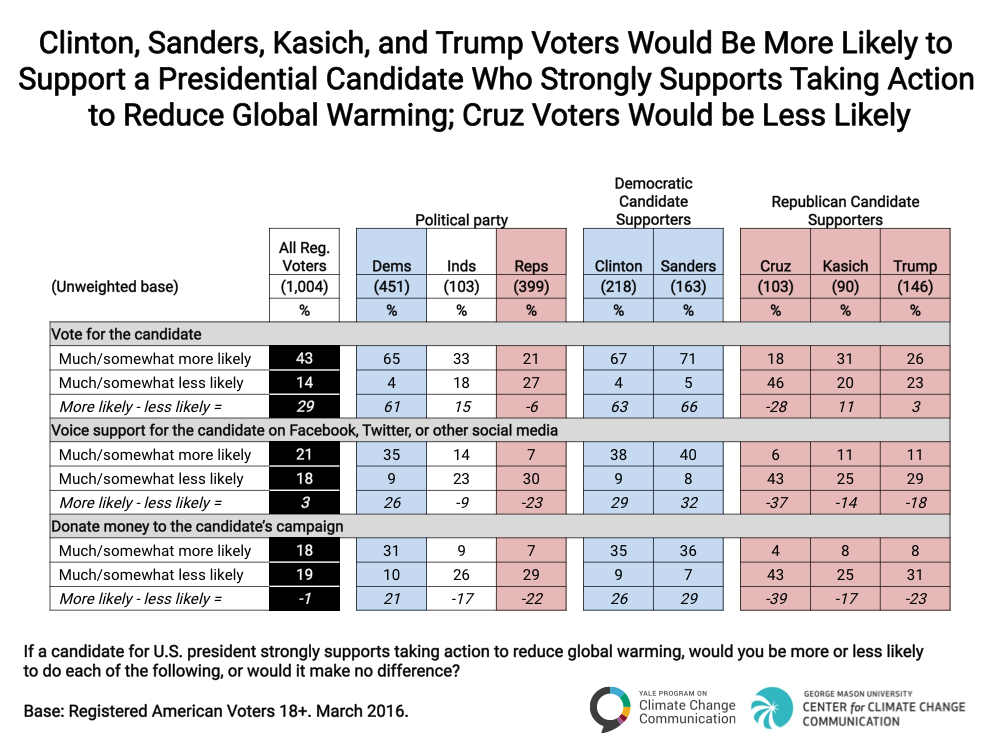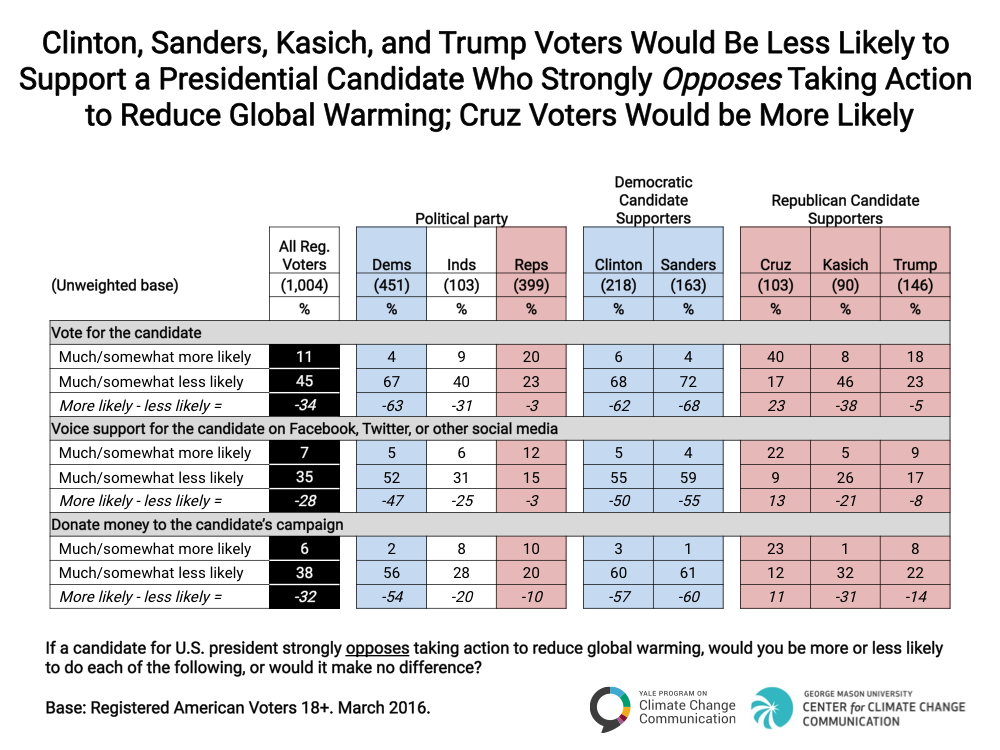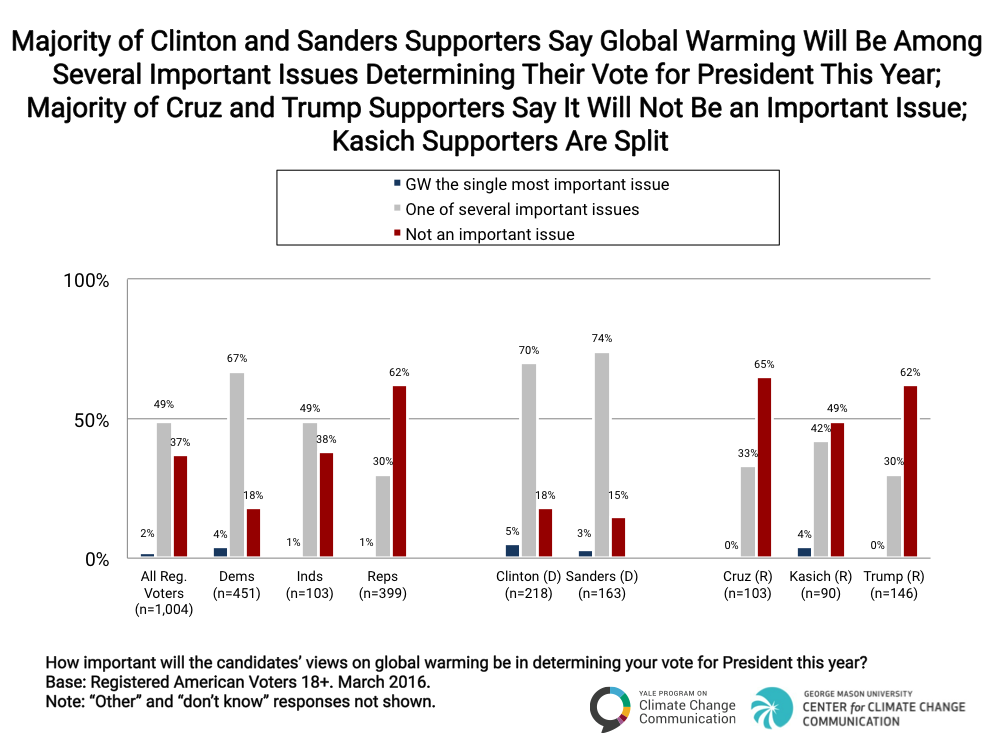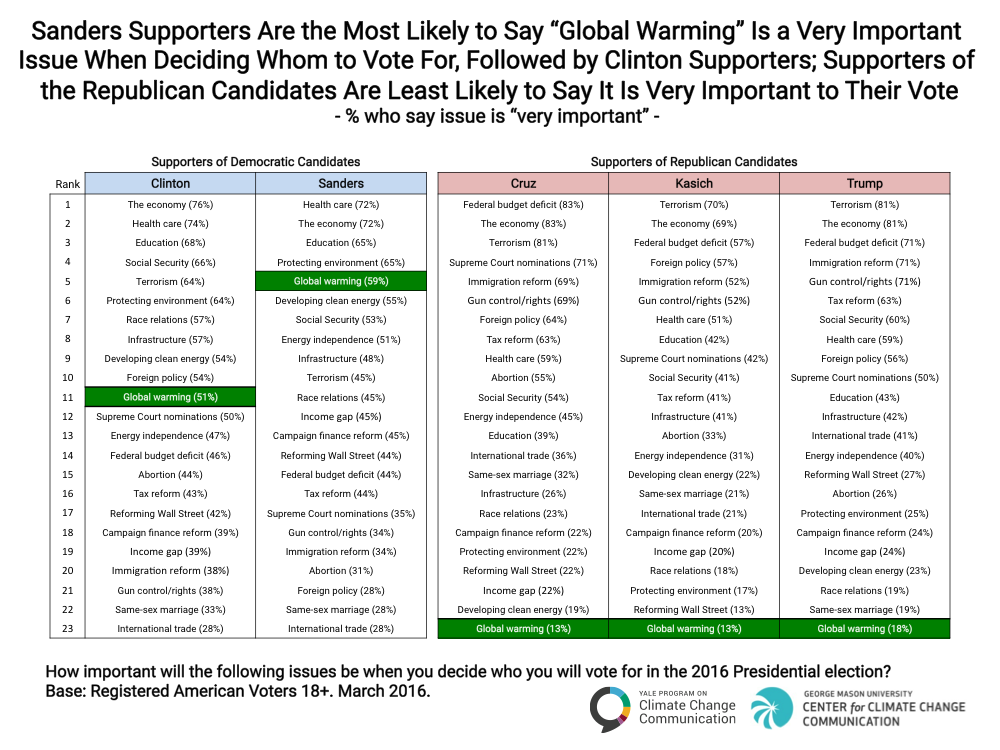Report · May 4, 2016
Global Warming and the 2016 U.S. Presidential Election
By Anthony Leiserowitz, Edward Maibach, Connie Roser-Renouf, Geoff Feinberg and Seth Rosenthal
Filed under: Beliefs & Attitudes and Policy & Politics
2. Global Warming as an Issue in the November 2016 Election
2.1. Clinton, Sanders, Kasich, and Trump voters would be more likely to support a presidential candidate who strongly supports taking action to reduce global warming. Cruz voters would be less likely.
Supporters of all candidates—except Cruz—are more likely to vote for a presidential candidate who strongly supports taking action to reduce global warming.
On balance, Democratic voters are much more likely to support a candidate who strongly supports taking action to reduce global warming. Clinton supporters are 63 percentage points more likely than less likely to vote for such a candidate. Similarly, Sanders supporters are 66 points more, rather than less, likely to vote for such a candidate.
Kasich supporters are also more likely to vote for a candidate who strongly supports taking action to reduce global warming, but by a smaller margin (+11 percentage points). Trump supporters are also marginally more likely to vote for a candidate who strongly supports taking action to reduce global warming (+3 points).
By contrast, Cruz supporters would be less likely to vote for a candidate who strongly supports global warming action—by a margin of 28 points.
Democratic candidate voters are more likely to voice support on social media for a candidate who supports taking action to reduce global warming (Sanders: +32 points, Clinton: +29). Republican supporters, conversely, are less likely to voice support on social media (Cruz: -37 points, Trump: -18, Kasich: -14). The fact that Kasich and Trump supporters would be more likely to vote for a candidate who supports climate action, yet less likely to voice support for him or her on social media may indicate that Republican supporters who think climate change is happening may fear criticism from their peers for voicing their views.
Supporters of the Democratic candidates are also more likely to donate money to the campaign of a presidential candidate who supports climate action (Sanders: +29 points, Clinton: +26), but Republican supporters are less likely to do so (Cruz: -39 points, Trump: -23, Kasich: -17).
2.2. Clinton, Sanders, Kasich, and Trump voters would be less likely to support a presidential candidate who strongly opposes taking action to reduce global warming. Cruz voters would be more likely.
Conversely, supporters of all candidates—except Cruz—are less likely to vote for a presidential candidate who strongly opposes taking action to reduce global warming.
On balance, Democratic voters are the least likely to support a candidate who strongly opposes action to reduce global warming. Sanders supporters are 68 percentage points less likely to say they would vote for such a candidate. Similarly, Clinton supporters are 62 points less likely.
Kasich supporters are also less likely to vote for a candidate who strongly opposes taking action to reduce global warming, by a large margin—38 percentage points. Trump supporters are also less likely to vote for a candidate who strongly opposes taking action to reduce global warming, but by a smaller margin—5 points.
By contrast, Cruz supporters would be more likely to vote for a candidate who strongly opposes global warming action—by a margin of 23 points.
Supporters of all candidates except Cruz are less likely to voice support on social media for a candidate who opposes taking action to reduce global warming (Sanders: -55 points, Clinton: -50, Kasich: -21, Trump: -8). Cruz supporters, by contrast, are more likely to voice support on social media (+13 points).
Supporters of all candidates except Cruz are also less likely to donate money to the campaign of a presidential candidate who opposes climate action (Sanders: -60 points, Clinton: -57, Kasich: -31, Trump: -14). Cruz supporters, by contrast, are more likely to donate to the candidate’s campaign (+11 points).
2.3. The majority of Clinton and Sanders supporters say global warming will be among several important issues determining their vote for president this year. The majority of Cruz and Trump supporters say it will not be an important issue. Kasich supporters are split.
While very few voters say global warming will be the most important issue to them when picking a candidate to vote for this year (2%), about half (49%) say it will be among several important issues.
Supporters of the Democratic candidates are most likely to say it will be among several important issues (Sanders: 74%, Clinton: 70%). By contrast, fewer than half of the Republican candidate supporters say the same (Kasich: 42%, Cruz: 33%, Trump: 30%).
2.4. Sanders supporters are the most likely to say global warming is a very important issue when deciding whom to vote for, followed by Clinton supporters. Supporters of the Republican candidates are least likely to say it is very important to their vote.
Among the issues voters say will influence their vote for President in 2016, global warming ranked 5th in importance of the 23 issues asked about among Sanders voters (59% say it is “very important”) and 11th highest for Clinton supporters (51% say it is “very important”).
By contrast, supporters of the Republican candidates are least likely to say global warming is very important to them among the 23 issues (Trump: 18%, Kasich: 13%, Cruz: 13%).



